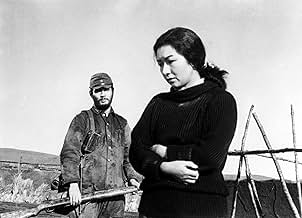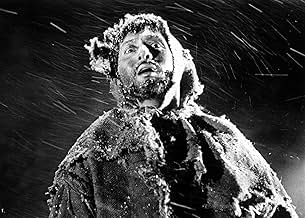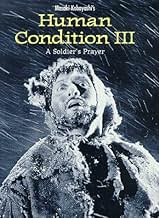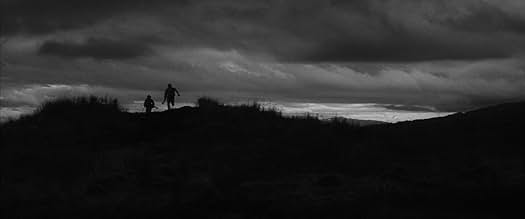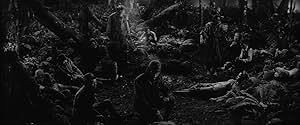La Condition de l'homme 3 - La Prière du soldat
Titre original : Ningen no jôken
NOTE IMDb
8,8/10
8,1 k
MA NOTE
Ses idéaux ayant été mis au défi par son appel sous les drapeaux de l'armée japonaise en temps de guerre, un pacifiste affronte des épreuves de plus en plus grandes pour survivre.Ses idéaux ayant été mis au défi par son appel sous les drapeaux de l'armée japonaise en temps de guerre, un pacifiste affronte des épreuves de plus en plus grandes pour survivre.Ses idéaux ayant été mis au défi par son appel sous les drapeaux de l'armée japonaise en temps de guerre, un pacifiste affronte des épreuves de plus en plus grandes pour survivre.
- Réalisation
- Scénario
- Casting principal
- Récompenses
- 5 victoires au total
Avis à la une
The Japanese troops are defeated by the Soviets and Kaji (Tatsuya Nakadai) heads with three survivors to South Manchurian expecting to meet his wife. Along their crossing through the enemy line in the Manchurian land, other Japanese survivors join Kaji's group, but they need to fight against the Chinese militias and the Soviets.
When they reach a Japanese village with women and one old man, a militia arrives in the place and Kaji and his men surrender to the Soviet to spare the women. The POWs are sent to a labor work camp and Kaji sees no difference between the treatment of the Japanese fascists and the Soviet communists, in which principles Kaji believed. He decides to escape from the camp to meet his beloved Michiko again.
"The Human Condition – Parts V & VI" is the last sequel of the heartbreaking anti-war masterpiece by Masaki Kobayashi. The story is impressively realistic and magnificently shot with top-notch camera work, giving the sensation of a documentary. I have seen many powerful movies about war, such as "Der Untergang", "Taegukgi hwinalrimyeo", "La Battaglia di Algeri", "Paths of Glory" and "Apocalypse Now" among others. But "The Human Condition" is certainly the most scathing antiwar movie that I have seen and I did not feel the 574 minutes running time in a black-and-white movie spoken in Japanese, Mandarin and Russian with English subtitles.
It is impressive to see the treatment spent by the fascist Japanese soldiers for the rookies and how Kaji grows-up and learns how his idealistic concept of communism is shattered when he becomes a POW and swaps his initial position of supervisor to the one of prisoner. The hopeless conclusion fits perfectly to this masterpiece and shows that in times of war, people are far from the condition for being human to survive. My vote is ten.
Title (Brazil): Not Available
When they reach a Japanese village with women and one old man, a militia arrives in the place and Kaji and his men surrender to the Soviet to spare the women. The POWs are sent to a labor work camp and Kaji sees no difference between the treatment of the Japanese fascists and the Soviet communists, in which principles Kaji believed. He decides to escape from the camp to meet his beloved Michiko again.
"The Human Condition – Parts V & VI" is the last sequel of the heartbreaking anti-war masterpiece by Masaki Kobayashi. The story is impressively realistic and magnificently shot with top-notch camera work, giving the sensation of a documentary. I have seen many powerful movies about war, such as "Der Untergang", "Taegukgi hwinalrimyeo", "La Battaglia di Algeri", "Paths of Glory" and "Apocalypse Now" among others. But "The Human Condition" is certainly the most scathing antiwar movie that I have seen and I did not feel the 574 minutes running time in a black-and-white movie spoken in Japanese, Mandarin and Russian with English subtitles.
It is impressive to see the treatment spent by the fascist Japanese soldiers for the rookies and how Kaji grows-up and learns how his idealistic concept of communism is shattered when he becomes a POW and swaps his initial position of supervisor to the one of prisoner. The hopeless conclusion fits perfectly to this masterpiece and shows that in times of war, people are far from the condition for being human to survive. My vote is ten.
Title (Brazil): Not Available
When people think of anti-war films titles such as Platoon, All Quiet on the Western Front and Schindler's List almost immediately come to mind; such films have defined the genre in American culture. However very few directors have provided the perspective from the axis point of view, and fewer still were able to do so in a way that humanizes all countries, not just the protagonist's. Masaki Kobayashi, who is most well known for his samurai pictures such as Seppuku and Samurai Rebellion is able to form such a film, without even a hint of pretentiousness.
The series of films spans nearly ten hours, following a pacifist named Kaji (Tatsuya Nakadai), as he struggles to keep his principles during war times. First as an overseer of a P.O.W. camp, then as a soldier. Due to the length of the film, the level of character development and acting quality, we end up feeling his frustration, pain and triumphs, as each occasion leaves room for both a triumph of the human spirit and subjugation of it. Kaji despises both warfare and violence of all kinds, yet tries to rationalize it for the good of those around him. We become so attached to him and his struggle, that we begin to feel similarly, and as a result we are left with one of the most moving chronicles of the loss that war becomes. I won't spoil anything, but any viewer will be floored by the end, it left me utterly breathless.
So overall I recommend it quite highly, its one of the few great anti-war statements that has aged VERY well in the modern day, and possibly Kobayashi's greatest work. Never slow, yet at the same time never glorifying the action, it is a film that I eagerly await to see re-released.
10/10.
The series of films spans nearly ten hours, following a pacifist named Kaji (Tatsuya Nakadai), as he struggles to keep his principles during war times. First as an overseer of a P.O.W. camp, then as a soldier. Due to the length of the film, the level of character development and acting quality, we end up feeling his frustration, pain and triumphs, as each occasion leaves room for both a triumph of the human spirit and subjugation of it. Kaji despises both warfare and violence of all kinds, yet tries to rationalize it for the good of those around him. We become so attached to him and his struggle, that we begin to feel similarly, and as a result we are left with one of the most moving chronicles of the loss that war becomes. I won't spoil anything, but any viewer will be floored by the end, it left me utterly breathless.
So overall I recommend it quite highly, its one of the few great anti-war statements that has aged VERY well in the modern day, and possibly Kobayashi's greatest work. Never slow, yet at the same time never glorifying the action, it is a film that I eagerly await to see re-released.
10/10.
Ningen no jôken is a masterpiece film but is also painful to watch most of the time. Nonetheless, it is a tour de force to be lauded for its direction, cinematography and acting at every turn. Most of those commenting in previous discussions mention the virulent anti-war sentiment of the film which is abundantly evident. It was interesting that much of the film is autobiographical, inspired by Kobayashi's war experiences. He too refused to be an officer when he qualified, and stayed a private throughout the war. An interesting point came up when I was watching the fourth DVD in the Criterion edition of The HumanCondition which is a series of three insightful interviews. During his comments the director Masahiro Shinoda mentioned that he thought at the time, the romantic love Kaji had for his wife, Michiko, was overly sentimental and unrealistic. He thought that it was due to the fact that Kobayashi and his peers were born of another age whose romanticism was the norm and unsullied by his generation's sobering war experience. He said that he had also consulted the internet to see the opinions of the film among contemporary young people in Japan today, and found that they too, thought the love unrealistic. He felt the love should have been more erotic and less idealized. The remarks of another commentator solidified my opinion of this issue about Kaji's love. That writer stated that the title really means more like "condition for being human." This confirmed my opinion that Kobayashi's point of the film is that what makes one human, in the best sense of the word, is love. Otherwise we devolve into some type of cruel bestiality found in the phrase 'man's inhumanity to man.' This inhumanity is evident throughout the film, whether in the sadism of the other Japanese soldiers, the cruelty of the guards to the Chinese prisoners, or in the malice of the of the Russian overseers. However, the Kaji character is set apart: he sticks to his ideals, he is humble, he displays selflessness as seen when he gives his food to another or when leading the men and puts them ahead of himself. He is a type of everyman whose being is elevated above merely satisfying physical needs and responding to base instincts. He remains an ennobled human not a saint above the fray, but his love gives him the will to live, to continue on and to even do good when surrounded by evil. Love is the condition for being human.
If you have any remote interest in film go see this right away. Don't bother watching if you are too scared to attempt the entire 10 hours in one sitting. It's worth it and then some. The actor playing Kaji was terrific and each part turns out better than the last (everything really, the acting/camera work... all the bells and whistles just sound better the further in you get). It definitely struck me as something Adolfas Mekas would totally dig, which says a lot. This is a must see. If you decide to bring the wife and kids (or husband and mother-in-law or what- have-you) just be warned: this movie involves a fair amount of human suffering, on and off the screen. -Ed Hellman.
Le saviez-vous
- AnecdotesIs the first Japanese movie in stereo.
Meilleurs choix
Connectez-vous pour évaluer et suivre la liste de favoris afin de recevoir des recommandations personnalisées
- How long is The Human Condition III: A Soldier's Prayer?Alimenté par Alexa
Détails
- Date de sortie
- Pays d’origine
- Langues
- Aussi connu sous le nom de
- The Human Condition III: A Soldier's Prayer
- Lieux de tournage
- Rishiri-Rebun-Sarobetsu National Park, Hokkaido, Japon(The final scene was shot on the Sarobetsu Plain.)
- Sociétés de production
- Voir plus de crédits d'entreprise sur IMDbPro
- Durée3 heures 10 minutes
- Couleur
- Rapport de forme
- 2.35 : 1
Contribuer à cette page
Suggérer une modification ou ajouter du contenu manquant

Lacune principale
What is the German language plot outline for La Condition de l'homme 3 - La Prière du soldat (1961)?
Répondre
